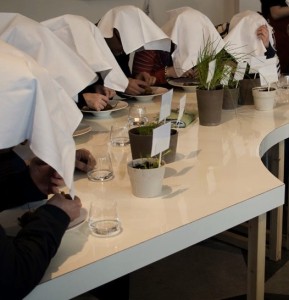
The Ortolan is a songbird about as large as your thumb. Its head is green-gray, and its song is slight. It eats seeds.
The high class and sophisticated of Europe have been dining on Ortolan since Antiquity. The traditional first step was to blind the bird with knives. Current preparation is more humane. The birds keep their eyes; they are instead shut into a tiny dark box. The rest of the preparation is the same.
Its brain processing the dark as endless night, the songbird gorges on millet day after day. It balloons 400%. On the day of your dinner party, it is reprieved from its gluttony. It is held down flapping into a bottle of Armagnac until it is drowned.
- Photo: Center for Genomic Gastronomy
The bird is then plucked, its feet chopped away, and roasted in a ramekin for eight minutes. Your chef presents it whole, yellow fat spitting, and you eat it all at once, though the more squeamish gastronome is known to first bite off the head and set it aside.
Food critics praise the first odiferous splurge of brandy against the nostrils, the delicacy of the fat, the crisp crunch of the bones. They say you can taste the ocean air and the gamey fecundity of the earth captured in its liver, kidneys, bowels. “It is absolutely delicious,” stated an American journalist on NPR. “With the texture and flavor of hazelnuts.
The journalist tasted the Ortolan at Françios Mitterrand’s famous last supper on New Year’s Eve 1995. The Ortolan’s population has dropped by about 30% in the last 13 years, and it is thus officially endangered, its capture, sale, and consumption prohibited by both France and the E.U. But its annual migration to Africa takes it through the southwest of France, the countryside of Mitterrand’s youth.
And Mitterrand was dying. He had had cancer even when first elected in 1981, though he never let on. In the winter of 1995, its job was almost done, leaving the former President looking a bit like William Burroughs at the end of his run. So Mitterrand travelled to Egypt with his mistress and their teenage daughter. He sat shriveled in the shadows of the Sphinx and the pyramids and surely wondered at his own shadow on history. Forty years after the imperial empires of Western Europe petered into collapse and intra-European warfare had been outsourced was no great stage from which history can pluck a man. There would be no bards to sing of his years as there were for Antiquity’s leaders. What could a man like him hope to leave behind?
So he invited his closest friends and journalists to his Last Supper. He gorged on dozens of oysters, fois gras, caipon, a 1900 Haut-Médoc. Two bodyguards held him up so he could suck and chew. His guests waited patiently for their host to finish each dish before starting theirs. He slept slack-jawed between courses, wrapped in a blanket.
The current tradition of eating Ortolan, begun by an 18th Century priest, is to drape your head in an ironed, white napkin. The given reasons include (1) to better preserve the aroma of the brandy and fat around your nostrils, (2) to hide from company the sloppy, dripping nature of the process, and (3) to “conceal your greed from God.” Mitterrand’s guests each ate one bird. Mitterrand had two. His guests reported the rapture in his eyes and down his chin when he drew the napkin away. He died eight days later.
I do not know Françios Mitterrand well enough to weigh in on his policies or the way he treated his people and represented them to the world. Nineteen-ninety-five—the year that the WTO was created, the year that Mississippi finally ratified the 13th Amendment—was also the year that a women from Arles, Jeanne Calment, died at the age of 120 years and 238 days. She had taken up fencing at 84 and smoked until 117. Yitzhak Rabin had been assassinated two months before.
Roast Ortolan is frequently cited as “the soul of France,” so perhaps that is why Mitterrand chose it as his final public expression of self. Perhaps, about to pass over the threshold, that rapture on his face was the pinnacle of his right to enjoy the pleasures accorded him. Gluttony? Aggression? It was merely common sense. It was doing all you can precisely because you can, and taking happy stock of yourself in the ample room of your conscience. To point out anything else tucked beneath that ironed, white napkin, well, that would just be bad manners.
